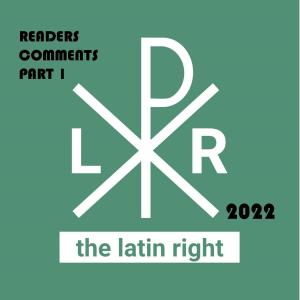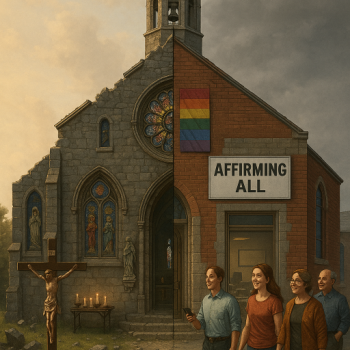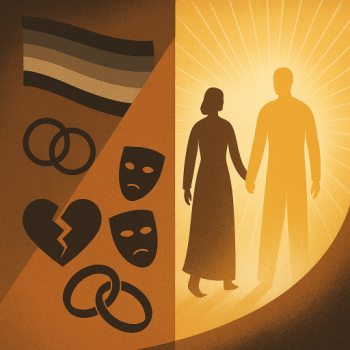I take great pleasure in writing for Patheos. Part of that pleasure come from engaging in spirited dialogue with my readers. I feel that if someone takes the time to read my articles and comment on what they read, I must return the compliment. In my opinion, the best learning comes through a dialectic or Socratic method.
The Socratic method is a form of cooperative dialogue whereby participants make assertions about a particular topic, investigate those assertions with questions designed to uncover presuppositions and stimulate critical thinking, and finally come to mutual agreement and understanding about the topic under discussion (though such mutual agreement is not guaranteed or required).
In this article, I look back at some of the comments made by readers. I list the article (with a link) and the comments below them. Also included are my responses to those comments and further commentary, if needed. Not all comments are posted. If one of yours did not get picked, please post them in the comments section and we will revisit them together and hash it out.
Again, thank you for reading my blog! God bless and Merry Christmas!
The New Testament Was An Afterthought
Comment:
The OT appears the same way, in context. But, ultimately, it proves to have been God’s will all along. Pope Peter describes that process and calls Paul’s hard to understand writing scriptura. Christ said He would send the Spirit to lead the Church into all truth. Surely that would mean writing such as had always been the case. Christ remains Head of the Church as all this is happening. The Fathers clearly saw all of this as God’s doing. And, the NT has remained the single most significant source of inspiration and guidance throughout history, socially as well as spiritually and theologically. To say the NT was an after thought is to say the Cross was an after thought. After all, the promised New Covenant would require a written Law just as the Old Covenant had.
TLR Response:
To me, the afterthought means the NT was not the purpose of Christ’s coming to earth. He established a Church, not a literary society. His Church then wrote things that were eventually complied into a “book” that this same Church authorized. This in no way takes away the NT’s significance or Christ’s work on the cross. Peace.
Follow Up
Moreover, to reiterate the point of the article:
The Church existed decades before a single letter written in the NT. Those in the Church wrote every word of the NT and those in the Church eventually determined the approved content of the NT. Moreover, as the Church’s book, the proper interpretation of the NT (and the whole Bible) belongs to the Church. Jesus established a Church, not a book club. God allowed the Church to write and compile a book. He never commanded its creation, and the Church exists with or without it.
Christ came to provide us with Himself, not a mere book. The book appeared later. Furthermore, the Church existence does not depend on the Bible. Theoretically, the Church could exist without a Bible, as it existed decades and centuries before the Bible’s completion.
The Jesus Prerogative: On Women Priests
Comment:
Inter Insigniores is about the religious patriarchal understanding of maleness. The term “patriarchy” is not used for obvious reasons. This declaration is a literalist interpretation of the 12 male apostles chosen by Jesus under the Old Law to represent the patriarchs of the 12 tribes of Israel.
After the resurrection and the ascension, the Church elected Matthias to replace Judas, and has since elected all successors to the apostles. Why is it that Matthias was chosen by the Church to be an apostle, and not Mary Magdalene? Because the witness of Mary Magdalene, or any other woman, was considered worthless.
After the resurrection, under the New Law, the Church is given full authority to mediate all vocations. By the power of the keys, the Church can ordain women at any time, without waiting for the Lord to return and give permission. It doesn’t make sense to say that the Church is not authorized to ordain women.
TLR Response:
It is my understanding that Jesus instituted the New Covenant, so His ministry falls understand that umbrella. Where do you get that the apostles viewed the witness of Mary Magdalene (and the other women including Jesus’ mother) as worthless? You make this assumption and then hypothesize on the decision of the Church’s choice on Matthias. Where in the history of the Church has it ever been stated that, by the power of the keys, the Church has the authority to ordain women. This is just an opinion of yours and does not reflect the historical teaching of the Church, teaching you reject as patriarchal and therefore invalid. What does not make sense is the Church changing 2000 years of doctrine to satisfy a perceived cultural injustice against women.
Follow Up:
Since the time I wrote this article, my opinion remains the same. Women’s ordination remains an impossibility within the Catholic Church. This impossibility is not due to the “patriarchy” but due to the choice of Jesus. Therefore, the Church simply lacks the authority to overrule Him.
The God of the Personal (Pronouns)
Comment:
The entire Bible is a patriarchal artifact. It contains divine revelation, but it is written in patriarchal language. The patriarchal terminology of the Bible does not mean that God is a patriarchy, and it does not mandate that the church should be a patriarchy. On the “maleness” of God, see the Catechism of the Catholic Church sections 239, 370, and 2779. On the maleness of “God the Father,” see Dives in misericordia, note 52, on the meaning of the terms “hesed” (masculine, paternal love) and “rahamim” (feminine, maternal love). JPII’s Theology of the Body also dismantles the ancient patriarchal misconceptions about male versus female essentialism. Bodies are (normally) male or female. Human persons are male *and* female, not male *or* female. Divine persons transcend gender. Patriarchy (including religious patriarchy) is a human culture, not a matter of faith.
TLR Response:
I agree that God transcends gender. I even wrote that in my article. My point is that God’s revelation also “transcends” patriarchy. I am not stating that God the Father is a male, although Jesus is a male.
God chose to reveal Himself through masculine nouns and pronouns for a reason—divine fatherhood. As humans, we understand relationships rooted in family, as the first relationships we form are familial. We understand the concept of father, mother, sister, brother, son, and daughter on deep and abiding levels. God created the human family and intended it as our first primer on the nature of God’s relationship to humanity. God desired the relationship with His creation to be a fatherly one. This is most reflected in the relationship between the Son (Jesus) and His Father (God). This imagery also makes the most sense out of Mary’s participation in salvation history as Theotokos (the Mother of God).
Follow Up:
Nothing to add here.
Gospel Lost: the Romanist Gospel Revisited
Comment:
As a non-denominational believer, I take no position on the Protestant gospel or the Catholic gospel.
Everything we receive from God is by grace through faith – not by good works. Nothing we can do within our humanity can cause us to be justified (or made righteous) in the eyes of God. Remember what Jesus told Nicodemus; “You must be born again.”
So much of traditional Protestant and Catholic religion hangs on the performance of works rather than faith in Jesus Christ and what He accomplished through His death, burial and resurrection. Jesus Himself tells us that “the traditions of men render the word of God to no effect” (Mark 7:13).
The Word of God, which is God-breathed (and actually written by the guidance of Holy Spirit) – not the intellectual philosophies and vain imaginations of man – is the gospel we must embrace. Blessings to you all.
TRL Response:
Thanks for reading! Let me challenge you a little bit…
As a non-denominational believer, you are a part of the larger Protestant tradition. Non-denominationalism is a offshoot of the Anabaptist movement.
I totally agree that all we receive is from God and by His grace alone. Therefore, Catholics practice infant baptism. An infant can do nothing to earn God’s grace, not even through an act of faith. God’s grace acts upon the child through the faith of the adults raising them. Also, Catholics do not teach that a person is justified before God by their works alone. Justification is a process by which God transforms a person into the likeness of Jesus. This is not just a “declaration” of righteousness, it is a real transformation that takes place. Furthermore, Catholics teach that one is “born again” in baptism. This is also the historical teaching of the Church since the beginning.
St. James teaches the following:
“24 You see that a person is justified by works and not by faith alone. 25 And in the same way was not also Rahab the prostitute justified by works when she received the messengers and sent them out by another way? 26 For as the body apart from the spirit is dead, so also faith apart from works is dead.” James 2:24-26.
So, we see that we are not justified by faith alone or works alone. We are justified by faith working in love by God’s grace alone. You also make Mark 7:13 say more than the context teaches. Jesus was speaking against the Pharisees’ who focused on small things (like not washing hands), while ignoring greater things (like honoring your father and mother). He even points out the practice of Corban (not giving your parents support by declaring possessions set aside for God) as a prime example. So, this verse is not speaking against the Catholic view of works as “the tradition of men.”
The bible is the Word of God, true. But people can (and do) misinterpret it.
Follow Up:
Furthermore, to reiterate what constitutes the Romanist gospel, I quote again from the article:
The Catholic Church has always taught and will always teach the gospel (good news) of Christ. The Church teaches the Son of God became man, lived, died, buried, and rose again.
This is the gospel of Jesus Christ.
Thanks For Reading!
This end part one. Part two comes soon. Thank you!
If you enjoy my writing, please consider donating by clicking here. Thank you!
Read my other writing here.
Please click the link below to join.
Voices of the Faithful in the Synod on Synodality
Please make your voice heard.
I Support Church Teaching in the Synod of Synodality













